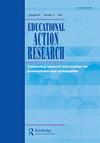社论
IF 1.2
Q3 EDUCATION & EDUCATIONAL RESEARCH
引用次数: 0
摘要
2023年的第三期包括12篇文章和一篇书评,其中包括来自11个不同国家的作者。这延续了近年来国际社会对行动研究和《教育行动研究》出版的兴趣显著增长的趋势。这里报道的工作来自与本杂志相关的两个主要学科,即健康和教育。这包括概念性的或基于文献综述的论文,包括方法论论点,但大多数论文直接涉及以符合行动研究的参与性目标的方式改变社会环境的尝试。他们涵盖了从儿童到成人的年龄段,并采用了从自学到合作形式的行动研究的一系列方法,涉及三个主要主题:教师发展、参与式行动研究方法和伦理。而且,与行动研究的广泛概念和实践学科相一致,它们之间存在相当大的多样性。这些主题中的第一个涉及使用行动研究促进教师的专业发展。因为行动研究是一个变化和学习的过程,它本身就可以被视为教育性的(因此这本杂志的名字叫《教育行动研究》)。正因为如此,也许也因为它在许多国家被采用的一些历史,行动研究不仅被用作一种教育过程,而且被用于教育学科。然而,它在这一领域的存在有点争议。对一些人来说,这只是,也许只是一种职业发展形式;对其他人来说,这相当于一种伪科学,是对“真实”研究的淡化。然而,行动研究作为改变教育、发展人和地方的一种手段一直存在,因为它为学习者和教育者提供了一种有所作为、实现变革的方式,可以说,还为他们的行动和环境施加了更多的影响。本期的第一篇文章从英国的角度探讨了这一主题。在“作为专业学习合作模式的“教师研究小组”中,Jones描述了一群教师如何在合作行动研究项目中工作,以发展自己的教学实践。这导致了实践的转变,这源于大学和学校合作者的创造性合作。第二篇论文没有报道行动研究,而是探讨了埃塞俄比亚学校采用行动研究的潜力。Feyisa、Feyisa,Moreda和Hailu的《在埃塞俄比亚奥罗米亚州贝尔区的一些选定中学进行行动研究的实践和挑战》一书的作者来自埃塞俄比亚和匈牙利,该书解决了行动研究蓬勃发展并产生影响所需的条件。这项研究表明,参与的学校中缺少了其中的许多,但作者看到并认为,如果满足这些条件,行动研究可能会产生影响。他们认为,这可以提供2023年教育行动研究,第31卷,第3期,405–408https://doi.org/10.1080/09650792.2023.2233270本文章由计算机程序翻译,如有差异,请以英文原文为准。
Editorial
This third issue of 2023 comprises 12 articles and one book review and includes authors from 11 different countries. This continues a trend in recent years which has seen a significant growth in the international interest in action research and in publishing in Educational Action Research. The work being reported here draws from the two main disciplines associated with this journal, namely health and education. This include papers which are conceptual or based on reviews of literature, including methodological arguments, but the majority are directly concerned with attempts to change social settings in a manner in keeping with the participatory goals of action research. Spanning the age range from children through to adults and engaging with a range of approaches, from self-study to collaborative forms of action research, they address three main themes: teacher development, participatory approaches to action research, and ethics. And, in keeping with the broad conceptual and practical discipline of action research, there is considerable diversity among them. The first of these themes concerns the use of action research for the professional development of teachers. Because action research is a process of both change and learning, it can be seen as educational in its own right (hence the name of this journal, Educational Action Research). Because of this, and perhaps also because of some of the history of its adoption in many countries, action research has been used not only as an educative process but also in the discipline of education. However, it has a slightly contentious existence in this field. To some it is solely, and perhaps simply, a form of professional development; to others it is tantamount to a form of pseudoscience, a watering down of ‘true’ research. And yet, action research endures as a means of changing education and developing people and places because it provides learners and educators alike with a way to make a difference, to achieve change, and, arguably, to exert more influence over their actions and settings. The first article of this issue addresses this theme from a UK perspective. In ‘The “Teacher Research Group” as a collaborative model of professional learning’, Jones describes how a group of teachers worked in a collaborative action research project to develop their own teaching practices. This led to a transformation in practices resulting from the creative collaboration of university-based and school-based collaborators. Rather than reporting on an action research study, the second paper explores the potential for action research to be adopted in schools in Ethiopia. With authors based in Ethiopia and in Hungary, ‘The practices and challenges of conducting action research in some selected secondary schools of Bale Zone, Oromia, Ethiopia’ by Feyisa, Feyisa, Moreda and Hailu, addresses the conditions necessary for action research to flourish and thus make a difference. The study show that many of these are missing in the participating schools, yet the authors see and argue that action research could yet make a difference, if these conditions were met. This, they suggest, could provide the EDUCATIONAL ACTION RESEARCH 2023, VOL. 31, NO. 3, 405–408 https://doi.org/10.1080/09650792.2023.2233270
求助全文
通过发布文献求助,成功后即可免费获取论文全文。
去求助
来源期刊

Educational Action Research
EDUCATION & EDUCATIONAL RESEARCH-
CiteScore
3.10
自引率
8.30%
发文量
48
期刊介绍:
Educational Action Research is concerned with exploring the dialogue between research and practice in educational settings. The considerable increase in interest in action research in recent years has been accompanied by the development of a number of different approaches: for example, to promote reflective practice; professional development; empowerment; understanding of tacit professional knowledge; curriculum development; individual, institutional and community change; and development of democratic management and administration. Proponents of all these share the common aim of ending the dislocation of research from practice, an aim which links them with those involved in participatory research and action inquiry. This journal publishes accounts of a range of action research and related studies, in education and across the professions, with the aim of making their outcomes widely available and exemplifying the variety of possible styles of reporting. It aims to establish and maintain a review of the literature of action research. It also provides a forum for dialogue on the methodological and epistemological issues, enabling different approaches to be subjected to critical reflection and analysis. The impetus for Educational Action Research came from CARN, the Collaborative Action Research Network, and since its foundation in 1992, EAR has been important in extending and strengthening this international network.
 求助内容:
求助内容: 应助结果提醒方式:
应助结果提醒方式:


